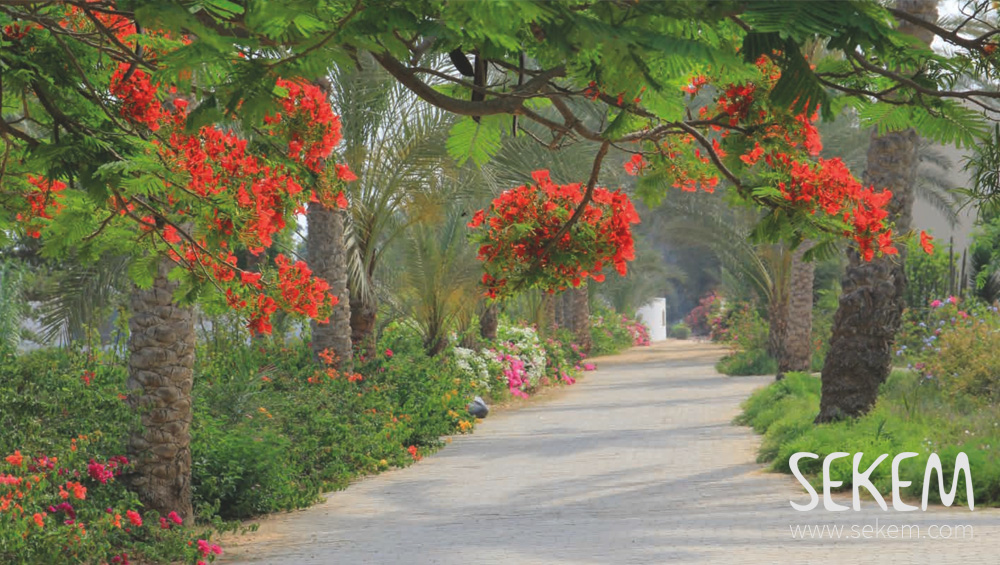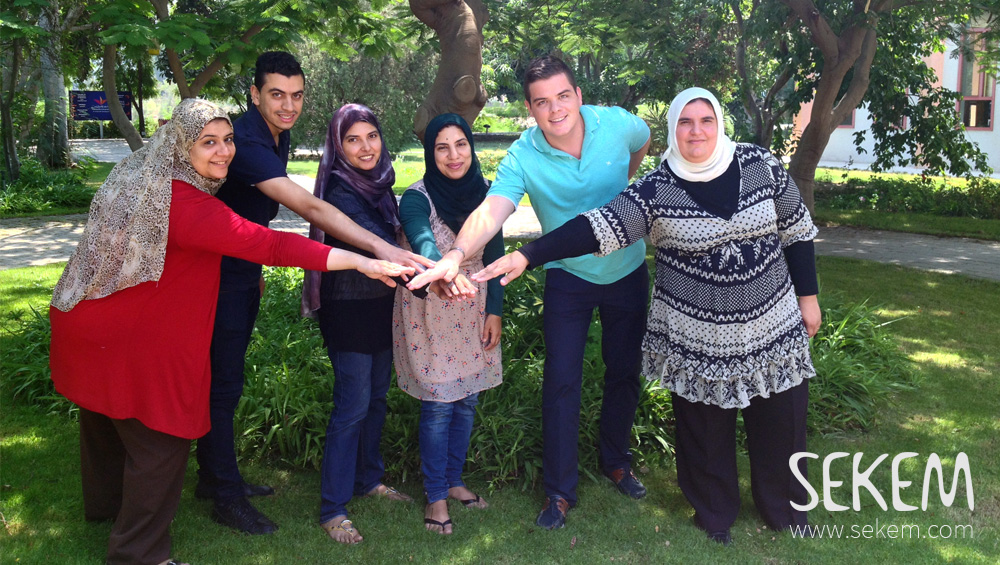The members of SEKEMs “Sustainability Team” are working on a large number of exciting projects that focus on the central mission of the initiative: boosting sustainability business practice in Egypt and abroad.
A sustainable approach to agriculture is vital to the future of Egypt and the region. We can build up the quality of soil, improve water use and build stronger community relations, but a sustainable way of financing these new models is also a priority.” This statement by Helmy Abouleish was recently published in the latest issue of the “Earth Security Index 2015”. The study seeks to show practical ways of how to deal with the increasing global resource insecurity. Paraphrasing SEKEMs intentions, Helmy Abouleish outlined its vision of a greener future.
The Waters of the Nile are not Inexhaustible
The study is published annually by the Earth Security Group, an independent think tank that supports companies and governments in the drafting of response plans to the growing global threat to their natural environments. This year SEKEMs Department for Sustainable Development has contributed to it for the second time with an extensive section on the common interests of countries along the Nile with regard to their food security.
The team is led by Maximilian Abouleish-Boes and consists of five professionals: Thoraya Seada, engineer and project manager, Dalia Abdou, analyst, Naglaa Ahmed, marketing specialist, and Heba Askar, an economist. Heba also takes care of public relations. Helmy Mohamed, a former SEKEM student, is also a part of the young group and in charge of data analysis. The team’s mandate is to research topics and consult SEKEM and other enterprises as well as carry out projects and engage in events.
Abouleish-Boes and his team have to deal with the most important aspects of sustainability at SEKEM in its four dimensions of activity on a daily basis: economy, ecology, culture, and social affairs.
“The countries neighbouring the Nile must face their water challenge together.”
Egypt‘s Challenges
The main ecological problem Egypt and its neighbours are presently facing is the scarcity of their natural water resources. The Nile does not supply enough water to secure the food supply for the growing populations of Egypt, Ethiopia, and Sudan over the coming decades. In addition, Egypt has very little arable ground and is therefore notoriously dependent on the import of food. The authors of the Earth Security Index deem it necessary that the Nile riparian countries support each other in their efforts to improve agricultural production techniques. They shall also address the issue of water scarcity together and assist each other in dealing with it systematically and in a sustainable fashion.
Research and Evaluation
In addition to the Earth Security analysis, SEKEMs sustainability team has also recently been involved in an environmental impact study, which was conducted on behalf of the United Nations Environmental Programme (UNEP). The “Green Economy Scoping Study for Egypt“ looks at the current situation of local markets and intends to support the change of consumption and production patterns to a greener economy.
Specifically, SEKEM has contributed data on organic agriculture to the study. For example, recent decades saw a strong increase in organic farms in Egypt who nevertheless rarely focus on the nutritional needs of Egyptians themselves. In the future, local interest in organic products is expected to rise significantly due to greater efforts for the promotion and marketing of organic foodstuffs.
The notion that more sustainable production techniques are seeing a boost in Egypt is also supported by the fact that Egyptian farmers witnessed a sharp decline in the use of pesticides over the past few years. In the early 1990ies, about 30,000 tonnes of chemical pesticides were still used every year. Today local farmers get along with a tenth of that quantity. “While this is obviously a great success, it is still far from being satisfactory: Egypt remains one of the countries in the world that use the most fertilizers”, explains Maximilian Abouleish-Boes.

Last but not least, the sustainability department is currently updating the well-known “100% Organic” study for Egypt. This study was originally published by SEKEMs partner company Soil & More International several years ago and compares the true production costs of products from organic and conventionally grown crops. It convincingly argues that conventionally grown food will be more expensive to produce in the future as food from organic farming. It does so with several case studies that reveal the actual production costs such as when the cost of CO2 emissions, soil pollution or subsidies are included in the calculation.
Together with the Heliopolis University, the team also carries out a number of research projects and ensures that their results are transformed into actual business practice.
Coordination and Communication
“We do not only do research and compile facts. We are also responsible for the organisation and communication of concrete development projects”, Abouleish-Boes adds. Since recently, these include various initiatives in the field of renewable energies. The issue of renewable energy production is held dear by many in SEKEM in times when the use of fossil fuels gets increasingly harder to justify. Recently, the initiative put the most powerful solar water pump in Egypt in operation (see The Power of the Sun – New Solarpump in El Wahat El Bahareya).
Applicable Research for True Developmental Challenges
To further applicable research that responds to actual development requirements has traditionally been SEKEMs core concern in the field of scientific work. The data to produce the Sustainability Report that documents the efforts of SEKEM in sustainable development is collected and evaluated at regular intervals by the “Sustainability Team”, too. “We have to constantly rethink the way we communicate the research that we do and the data that we collect. A particular challenge here are our activities in the fields of culture and social affairs”, says Maximilian Abouleish-Boes. “Within the SEKEM community these two dimensions enjoy the same status as economic and ecological activities, but they cannot as easy be conveyed through numbers alone.“
Presently, SEKEMs group of young researchers is investigating developments that need more constant observation than the annual report, such as an updated version of the “100% Organic” study that is due to arrive soon. “We can already reveal that its predictions indeed seem to come true as we could confirm them in most cases. Growing organic crops will be more cost-efficient and competitive in the future, than conventional farming.”
Christine Arlt
Green Economy Scoping Study for Egypt
Earth Security Index 2015

